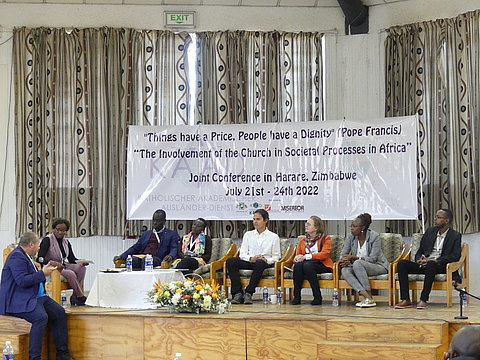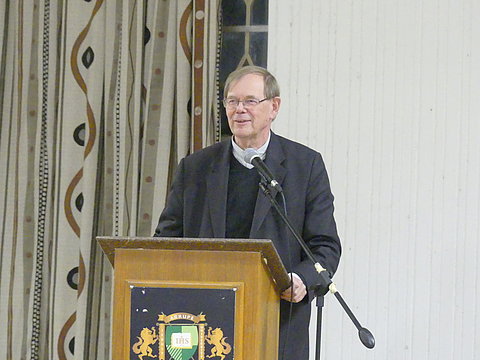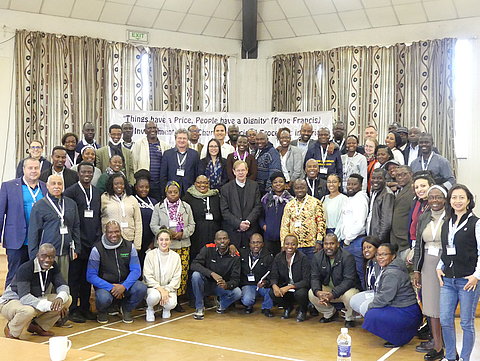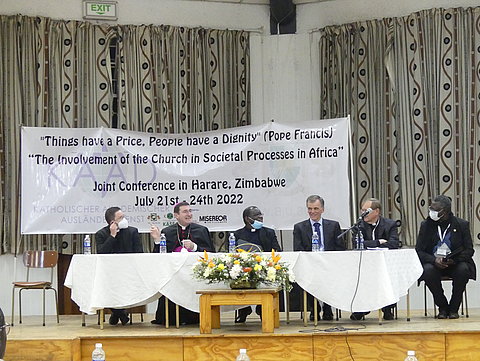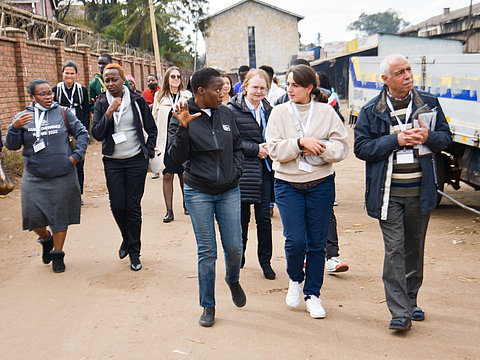The participants from AJU were headed by Fr. Dr. Joseph Oduor Afulo, Vice-Chancellor of the university and host of the conference. KAAD participants comprised of current scholars, alumni and partners from the host country Zimbabwe, but also from more than ten African countries as well as from Asia, Latin America, Europe and the Middle East. The chairlady of the KAAD-Partner Committee Dr. Locardia Shayamunda was a key partner and organizer of the Conference as well as Adio-Adet T. Dinike, the chairman of KASSA, the KAAD Association of Scholars from Southern Africa. The KAAD delegation from Germany was headed by the President, Fr. Dr. Hans Langendörfer SJ. Also present were two members of the KAAD Academic Committee, Prof. Margit Eckholt and Prof. Christoph de Oliveira Käppler and two staff members of the KAAD-Africa Department, Dr. Marko Kuhn and Fernanda Hulverscheidt Fagundes.
The aim of the conference was to contextualize Catholic social teaching in Africa in order to elaborate on the special situation in African societies with regard to social justice and the distribution of wealth, the fight against oppression, subsidiarity and the role of the state. The Archbishop of Harare, Robert C. Ndlovu, and the Apostolic Nuncio in Zimbabwe, Archbishop Paolo Rudelli, addressed in their speeches the special role of Church doctrine for a country like Zimbabwe, which has been in a political and economic crisis for a long time; the German ambassador in Harare, Udo Volz, acknowledged the positive and invaluable contribution of the church to Zimbabwe's society in his welcoming speech.
Dr. David Kaulemu, Lecturer in Philosophy and Social Ethics at Arrupe Jesuit University (AJU) and member of the KAAD Partner Panel in Zimbabwe, gave the keynote address on the first evening on the theme 'Pope Francis Declares that 'Things have a Price and People have a Dignity.' What does this mean in the Context of Africa?”, in which he criticized the fact that church actors were also increasingly submitting to the primacy of the economy, be it in church educational institutions, hospitals or social services. This would have negative repercussions worldwide, but is devastating in a country like Zimbabwe. He expressed concern that “parishes and missions will slowly be looking and working like market driven stations for the extraction of value or as bureaucratic structures for the management and governance of citizens”. He referred in particular to the impulses of Pope Francis, who emphasized that an economic system geared purely to growth and profit optimization kills because it focuses on money and only obeys money. Kaulem emphatically called the participants to listen to the pope’s cry when he says “No to an economy of exclusion! No to the throw away culture which turns human beings into rubbish! No to the commodification of everything including human beings!”
In his presentation on the second day of the conference, Fr. Dr. Hans Langendörfer SJ reflected on the participation of the Church in social processes in the German and European context. He decried that in Germany and other European countries the chances of a successful social activity of the church are decreasing and trust in the Catholic Church in particular is dwindling. Nevertheless, according to Langendörfer, the churches - especially in Germany - still have a wide range of opportunities for social commitment, which are well used. Using examples from the field of life ethics (protection of human embryos, surrogate motherhood), he showed that it was and is essential to come to good and fair compromises with social actors and politicians and thus to be as close to existing Catholic ethical positions as possible – instead of postulating one's own position as non-negotiable and staying out of the discussion from the start. Personal contacts with politicians are indispensable for a dialogue on an equal footing and the prerequisite for a debate on political projects of common interest for the benefit of the people affected.
In addition to lectures and plenary discussions, the participants from various regions of Africa and the world worked on the topic in workshops based on their own experiences and perspectives and presented their results in the plenary session.
At the end of the conference, the two KAAD alumni Dr. Catherine Biira (Uganda) and Christopher Otieno Omolo (Kenya/Tanzania) presented ten concrete theses for the future role of the church in African societies and beyond. A peak of their demands was that church actors in Africa should support credible individuals to run for political (elective) offices. The Church should thus 'supply' African governments with men and women of integrity who fear God and choose the preferred option of the poor. The two set another central point in the demand that executive leaders must be held accountable by church leaders. The Church in Africa has a central role to play in speaking truth to those in power in oppressive systems that perpetuate corruption, racism, discrimination, exploitation and abuse of marginalized groups within society. In this way, bishops and other church actors could reveal the inadequacy of policies based on coercion and falsehood, and show that the true source of power lies in servitude rather than domination.
In a succeeding panel discussion, the points were discussed further and other perspectives were added, for example by Prof. Margit Eckholt (Chair for Dogmatics and Fundamental Theology, University of Osnabrück) or by Oscar Perdomo Cabellos (KAAD scholarship holder from Colombia), showing that the more a society is characterized by religious plurality, the less internal church reform topics are discussed. If the Catholic Church is in a minority position, it is very much more concerned with inner stabilization and placing their issues in society as a whole. In Latin America, for example, reform issues similar to those in Western Europe are on the agenda in many places. In Ethiopia or Albania, however, the focus is more on peace and a reconciliation of interests between different ethnic groups. All participants agreed that a southward shift of the worldwide Catholic "gravitation" represents an epochal change and must also be reflected in theology and church leadership structures.
In addition to the academic part of the program with lectures and workshops, the participants visited various places in Harare and met representatives of various organizations and institutions in order to concretely experience and reflect on the social role of the Catholic Church in Zimbabwe. The “Education and Civil Society” section was illustrated by the agricultural education center Silveira House, which is committed to social justice, active citizenship, responsible politics and community development - it was founded and is run by Jesuits. The visit of the Catholic Commission of Justice and Peace to its headquarters in the Archdiocese of Harare was dedicated to the topic of "Justice and Peace" and the participants were inspired to a discussion how such action should look like in their local context. Education and upbringing alongside disadvantaged youth could be experienced and discussed specifically at St. Peter's Kubatana Training Center in the Highfield district, while the church's role in modern communication was discussed at the Jesuit Communications Centre.
Conference participants furthermore had the opportunity to take part in an 'art excursion' to the National Gallery, Mbare Art Space and Village Unhu or have a taste of African animals at 'Lion Park', Harare. The possibility of an "encore" was an African safari at Imire Rhino & Wildlife Conservation, which aims to ensure wildlife safety through long-term, sustainable environmental management and positive community projects.
On the last day, all participants celebrated a solemn final service in the church of Arrupe Jesuit University - the accompaniment of the service by rhythms and songs from Zimbabwe was particularly impressive for the guests from outside the country. Here, praying and celebrating together, the group experienced once again how the topics of the conference are related to local spirituality. They expressed how powerful it can be to build community across national and continental borders – especially when it comes to the commitment of Christians to justice and human dignity.
